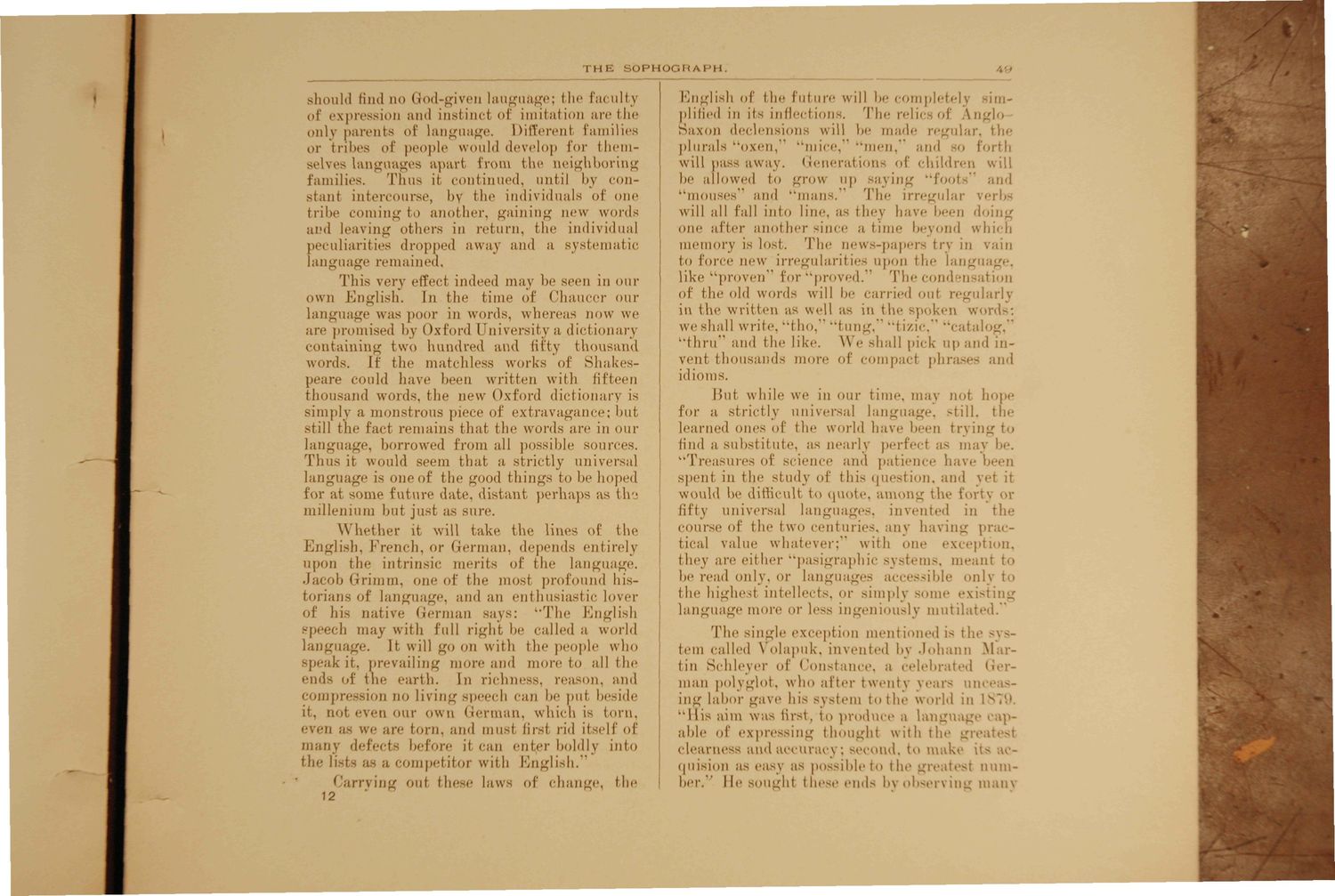| |
| |
Caption: Sophograph - 1891
This is a reduced-resolution page image for fast online browsing.

EXTRACTED TEXT FROM PAGE:
THE )P KAIMI. 41 should find no (Jod-given lauguage; the faculty o\' expression and instinct of imitation are the only parents of language. Different families or tribes of people would develop for themselves languages apart from the neighboring families. Thus it continued, until by constant intercourse, by the individuals of one tribe coming to another, gaining new words and leaving others in return, the individual peculiarities dropped away and a systematic language remained, This very effect indeed may he seen in our own English. In the time of Chaucer our language was poor in words, whereas now we are promised by Oxford University a dictionary containing two hundred and fifty thousand words. If the matchless works of Shakespeare could have been written with fifteen thousand words, the new Oxford dictionary is simply a monstrous piece of extravagance; but still the fact remains that the words are in our language, borrowed from all possible sources. Thus it would seem that a strictly universal Language is one of the good things to be hoped for at some future date, distant perhaps as tho millenium but just as sure. Whether it will take the lines of the English, French, or German, depends entirely upon the intrinsic merits of the language. Jacob Grimm, one of the most profound historians of language, and an enthusiastic lover of his native German says: '"The English speech may with full right be called a world language. It will goon with the people who speak if. prevailing more and more to all the ads of the earth. In richness, reason, and compri ion no living speech can be put beside it. not even our own German, which is torn, even Si we are torn, and muM lirsi rid itself of many defects before it can enter boldly into 1 the lists as a competitor with English/ Carrving out He • laws of change, the 12 English of the Future will be completely simplified in its inflections. The relics of Anglo Saxon declensions will be made regular, tie plurals "oxen," •'mice," ••men." and o forth will pass away. Generations of children will be allowed to grow up Saying "foot-" and "mouses" and "mans." The irregular \ •will all fall into line, as they have been doing one after another since a time beyond whicn m e m o r y is lost. T h e n e w s - p a p e r - t r y in vain to force new irregularities upon the language, 11 like "proven" for "proved. Theconden on of the old words will be carried oul regularly in the written as well as in the Bpoken W Is: < 11 11 we shall write, ••(ho." "tung, "tizic, "catalog," "thru"' and the like. A\ e shall pick up and invent thousands more of compact phrases and idioms. But while we in our tine-, may not hope for a strictly universal language, -till, tic learned ones of the world have been trving: find a substitute, as nearly perfect as may be. "Treasures of science and patience havebeen spent in the study of this question, and yet it would be difficult to (piote. among the fortj or fifty universal languages, invented in th< course of the two centuries, any having pi tical value whatever:" with one v\ iption, they are either "pasigraphic systems, meant to be read onlv. or languages accessible onlv t the highest intellects, or simply some existing language more or less ingeniously niutila 1." The single exception mentioned is the system called Volapuk. invented by Johann Martin Schleyer of Constance, a celebrated German polyglot, who after t went \ years mi s 1 ing labor gave his system to the world in I ".' "His aim was first, to produce a language capable of expressing thought with the grea clearness and accuracy; second, to make i; acquision as easy as possible to the greatest number." He sought these ends 1»\ observing main
| |